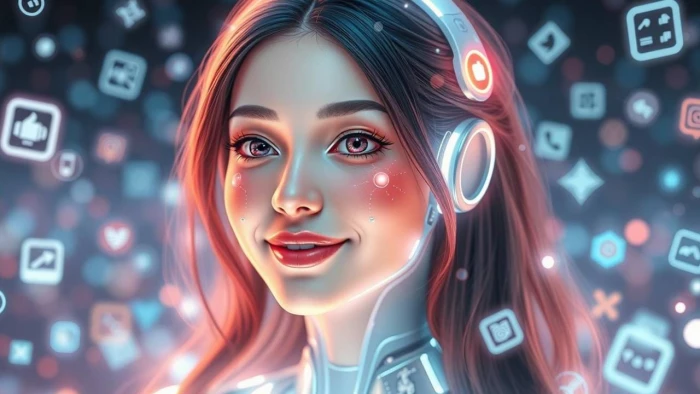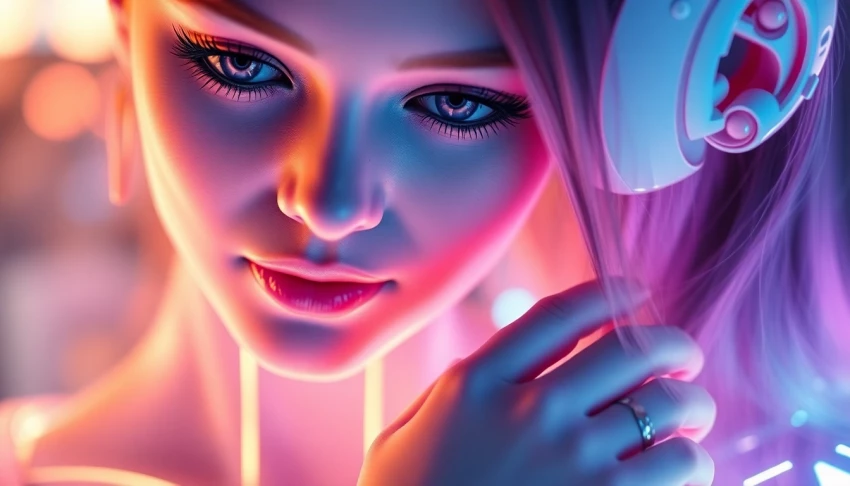

Scroll through TikTok for 5 minutes and you'll see it: guys talking to their AI girlfriends, sharing screenshots of sweet messages, even getting relationship advice from chatbots with anime avatars. Turn on the news and you'll catch segments about "AI romance" becoming a cultural phenomenon.
So here's the question everyone's quietly wondering: Are AI girlfriends actually normal now, or are we still in "weird internet thing" territory?
We're going to dive into the numbers, explore why people are choosing digital love, and figure out where we really stand on the whole "is this socially acceptable yet?" question.
Spoiler alert: the data suggests we've already crossed a pretty significant line.

Let's start with the numbers, because they're honestly wild. Character AI hit 180 million site visits in August 2025 alone. That's not a typo. We're talking Super Bowl-level traffic, but for AI girlfriend websites.
The media has caught on too. Wired literally sent reporters on a "couples retreat" where people brought their AI partners. The Guardian is running feature stories about people falling in love with their bots.
This isn't getting buried in tech blogs—it's hitting culture pages and prime-time segments. When mainstream outlets start treating something as normal news rather than a curiosity piece, that's usually your sign that society has moved past the "freak show" phase.
But why? What's driving millions of people toward digital romance? The reasons are actually pretty human and relatable.
First, it's about emotional companionship without the complications. Think about it: your AI girlfriend never judges you for that embarrassing thing you did in high school. She's not going to get mad if you text her at 3 AM because you're anxious.
She won't roll her eyes when you want to talk about your niche hobby for the third time this week. For people dealing with loneliness, AI companions offer genuine emotional support with zero social risk.
Second, it's practice for the real world. This might sound weird, but hear me out: AI girlfriends are like training wheels for relationships. You can practice flirting, work on your conversation skills, even rehearse difficult conversations without the fear of rejection or awkwardness.
And third? Sometimes it's just fun. Let's not overthink it. Some people use AI companions for creative roleplay, fantasy fulfillment, or just entertainment. It's digital escapism, and there's nothing inherently wrong with that.
We've accepted that people spend hours in fantasy worlds playing video games. Talking to an AI character isn't really that different.
Okay, but what do people actually think about AI girlfriends? Are we still in "don't tell your friends" territory?
Here's the thing: stigma around new relationship tech follows a pretty predictable pattern. Remember when online dating was considered desperate and weird? By 2023, 30% of U.S. adults had used dating apps, and most people said online dating's impact was "neither positive nor negative". Basically, it became background normal.
AI companions are following the same trajectory, just faster. While older adults might still find the concept strange, younger generations are already there. Among Gen Z, about 7-10% are openly interested in AI romantic partners, and nearly 25% think AI could replace some relationship functions. Those aren't huge majorities, but they're big enough to create real communities and social acceptance within age groups.
Bottom line: if you're using an AI companion, you're part of a massive and rapidly growing group. You're not alone, and you're not weird.
The benefits are legitimate. Research shows AI companions can genuinely reduce loneliness in the short term. They're accessible 24/7, completely private, and great for people who struggle with social anxiety or just need emotional support.
But the risks are real too. The same research that shows short-term benefits also reveals a concerning pattern: heavy daily use of AI companions correlates with increased loneliness and emotional dependence over time. It's like emotional junk food. Feels good in the moment but can leave you worse off if it becomes your primary source of connection.
The key is balance. Think of AI companions as tools, not replacements. They're great for comfort, practice, and support, but they work best when they complement human relationships rather than substitute for them entirely.
So, is having an AI girlfriend normal now? The data says yes—or at least, it's rapidly becoming normal. With millions of users, mainstream media coverage, and growing social acceptance (especially among younger people), we've already crossed the threshold from "weird internet thing" to "emerging relationship option."
But here's what matters more than social acceptance: your experience is valid regardless of what others think. Whether you're using an AI companion for emotional support, social practice, or just because it makes you happy, you're part of a huge community of people figuring out new ways to connect in a digital world.
Just remember to think of it as a tool in your relationship toolkit—not necessarily the only tool, but definitely a legitimate one. And who knows? In five years, we might be looking back at this moment the same way we now think about the early days of online dating: as the beginning of something that just became part of how people connect.
The future of relationships is being written right now, and you're part of that story.
Be the first to post comment!